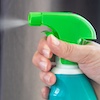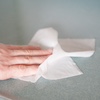1.800.858.7378npic@oregonstate.edu
Call, email, or chat Mon-Fri
A to Z

Antimicrobials for Pathogens
Blood and other body fluids have the potential to carry germs that can pose a public health threat. They can transmit hepatitis and many other diseases. Hospitals, medical and dental offices, laboratories, schools, and laundry facilities are just a few of the locations that can occasionally get contaminated with blood and body fluids containing infectious germs. Without the proper use of antimicrobial pesticides, these areas could pose a risk of infection to workers and others.
As such, the Occupational Safety and Health Administration (OSHA) created the Blood Borne Pathogen Standard to protect workers in these environments.
In order to protect public health, the EPA requires any product claiming to control disease-causing pathogens to prove their effectiveness before they are registered with the EPA and placed on the market.
Tips for selecting and using antimicrobial products:
- Check the product label for a list of pests (pathogens, germs) that the product may control. If your pest of concern is not on the label, the product may not be effective at controlling that pest.
- Some states provide a service that allows you to search for products by the pest(s) they control. Try searching pesticide registrations in your state.
- Know the local regulations about the types of antimicrobials that should be used in hospitals, day-care centers, food processing areas and other places where germs are a health threat. If you're not sure where to look for the regulations you need, call NPIC or your local health department.
Learn more about:
Additional Resources:
Disinfectants, Sanitizers, and Sterilants
- Label Guidance for Specific Types of Pesticides - Environmental Protection Agency (EPA)
- Selecting an Appropriate Sanitizer - Caring for Our Children: National Health and Safety Performance Standards
- Selected EPA-registered Disinfectants - EPA
- Liquid Chemical Sterilant Products - EPA
- CPAP Machine Cleaning: Ozone, UV Light Products Are Not FDA Approved - Food and Drug Administration (FDA)
- Disinfection and Sterilization Guideline - Centers for Disease Control and Prevention (CDC)
- Guideline for Disinfection and Sterilization in Healthcare Facilities - CDC
Other Resources:
- Pool Chemical Safety - Centers for Disease Control and Prevention (CDC)
- Preventing Pedicure Foot Spa Infections - Environmental Protection Agency (EPA)
- Bloodborne Pathogens - Occupational Safety and Health Administration (OSHA)
- Bloodborne Pathogen Standard (29 CFR 1910.1030) - Occupational Safety and Health Administration (OSHA)
- Bloodborne Pathogen Standard (29 CFR 1910) FAQ - Occupational Safety and Health Administration (OSHA)
- Bloodborne Pathogens: Questions and Answers about Occupational Exposure - Oregon OSHA
- Cleaning up Body Fluids - Caring for Our Children: National Health and Safety Performance Standards
Resources about specific pathogens:
Candida auris
- Preventing the Spread of C. auris - Centers for Disease Control and Prevention (CDC)
- Environmental Control of Candida auris with Antimicrobial Pesticides - Environmental Protection Agency (EPA)
- Antimicrobial Products Registered with EPA for Claims Against Candida auris - EPA
- Interim Guidance for the Efficacy Evaluation of Products for Claims against Candida auris - EPA
- Candida auris (C. auris) - CDC
Clostridium difficile
- Guidance for the Efficacy Evaluation of Products with Sporicidal Claims Against Clostridium difficile - Environmental Protection Agency (EPA)
- C. diff (Clostridioides difficile) - Centers for Disease Control and Prevention (CDC)
- Clostridium difficile Infection: Our biggest nosocomial problem? - Oregon Health Authority, Oregon Public Health Division
COVID-19 (SARS-CoV-2 Coronavirus)
- Providing Professional Disinfection Services: How to Manage Germs Safely and Effectively (video) - U.S. Environmental Protection Agency (EPA)
- Cleaning and Disinfecting: Best Practices During the COVID-19 Pandemic - U.S. EPA
- List N: Disinfectants for Use Against SARS-CoV-2 - EPA
- Using Disinfectants: COVID-19 - AAPCC
- Safer Cleaning, Sanitizing and Disinfecting Strategies to Reduce and Prevent COVID-19 Transmission - University of Washington
- Coronavirus (COVID-19) and Disinfectants - EPA
- Guidance for Cleaning and Disinfecting Public Spaces, Workplaces, Businesses, Schools and Homes - EPA
- When and How to Clean and Disinfect Your Home - Centers for Disease Control (CDC)
- Guidance to Registrants: Process for Making Claims Against Emerging Viral Pathogens not on EPA-Registered Disinfectant Labels - EPA
- Interim guidance for environmental cleaning in non-healthcare facilitates exposed to SARS-CoV-2 – European Centre for Disease Prevention and Control
- CPAP Machine Cleaning: Ozone, UV Light Products Are Not FDA Approved - Food and Drug Administration (FDA)
Ebola
- Disinfectants for Use Against the Ebola Virus - Environmental Protection Agency (EPA)
- Ebola Disease Basics - Centers for Disease Control and Prevention (CDC)
- Ebola - Occupational Safety and Health Administration (OSHA)
- Cleaning and Decontamination of Ebola on Surfaces - OSHA
- Interim Guidance for Environmental Infection Control in Hospitals for Ebola Virus - CDC
- Ebola Control and Prevention - OSHA
Flu Viruses (H1N1, Avian, etc.)
- Avian Influenza (Bird Flu) - Centers for Disease Control and Prevention (CDC)
- Registered Antimicrobial Products with Label Claims for Avian (Bird) Flu Disinfectants - Environmental Protection Agency (EPA)
- Antimicrobial Products Registered for Disinfection Use against Avian Influenza on Poultry Farms and Other Facilities - EPA
- Avian Influenza: Personal Protective Equipment (PPE) Guidelines - AgriSafe Network
- Preventing the Spread of Respiratory Viruses in Public Indoor Spaces - U.S. EPA
- Influenza (Flu) - CDC
MRSA (Methicillin-resistant Staphylococcus aureus)
- Methicillin-resistant Staphylococcus aureus (MRSA) Infections - Centers for Disease Control and Prevention (CDC)
- Preventing Methicillin-resistant Staphylococcus aureus (MRSA) - CDC
- Infection Control Guidance: Preventing MRSA in Healthcare Facilities - CDC
- Schools and Daycares: MRSA Prevention and Response - CDC
- Athletic Facilities: MRSA Prevention and Control - CDC
- Managers: Protect Correctional Staff from MRSA - CDC
- MRSA (Methicillin-Resistant Staphylococcus aureus) - North Carolina Department of Public Health
- List H: EPA's Registered Products Effective Against MRSA and Vancomycin Resistant (VRE) - Environmental Protection Agency (EPA)
- MRSA Factsheets & Posters - CDC
- Managing CA-MRSA in Incarcerated Populations - NC Department of Health and Human Services
- MRSA and Correctional Health - Commonwealth of Massachusetts
If you have questions about this, or any pesticide-related topic, please call NPIC at 800-858-7378, or email us at npic@oregonstate.edu.






